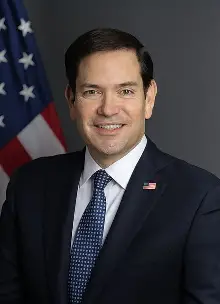United States Secretary of State Marco Rubio will travel to Mexico on Wednesday for his first visit since taking office, as the Trump administration intensifies its crackdown on illegal immigration and drug cartels while seeking to counter China’s influence in Latin America.
Washington’s top diplomat will meet President Claudia Sheinbaum and other Mexican officials in Mexico City before continuing to Ecuador. Rubio, the first Latino to hold the post, previously visited Central America and the Caribbean on his maiden foreign trip, signalling the administration’s renewed focus on the region.
The visit comes a day after the US military attacked a Venezuelan vessel in the Caribbean that American officials said was transporting illegal drugs. It was the first such operation since President Trump deployed additional warships to the area, escalating tensions with Caracas.
Trump has also stepped up efforts to deport undocumented migrants, dispatching federal agents into major US cities and imposing strict arrest quotas. The policy has drawn criticism from several Latin American leaders, including Sheinbaum, who has condemned recent immigration raids. Although she has maintained a working relationship with Trump, his trade policies and security measures against cartels have strained ties.
“The relationship is not in its best situation right now,” said Martha Bárcena Coqui, Mexico’s former ambassador to Washington and now a senior fellow at the Centre for Strategic and International Studies. She predicted “very candid” discussions on cartel violence during Rubio’s meetings.
Earlier this year, Washington designated certain Mexican cartels as terrorist organisations. While Sheinbaum has said the two countries are close to finalising a security agreement, she has rejected any suggestion of unilateral US military action on Mexican soil. Trump has nonetheless authorised the Pentagon to expand surveillance of cartel activity and to prepare for possible military force.
“The cartels are probably the most charged issue,” said Will Freeman, a Latin America specialist at the Council on Foreign Relations.
Officials in Washington also indicated that agreements on security, migration and countering Chinese influence could be announced during Rubio’s trip. The US is working closely with Mexico to prevent Beijing from using it as a means to bypass American tariffs or as a conduit for fentanyl shipments.
Trade disputes are also expected to loom large. In July, Mexico avoided new 30 per cent tariffs on its exports by agreeing to a 90-day window for trade negotiations, though it remains subject to 25 per cent duties on fentanyl-related products. Most goods covered by the US-Mexico-Canada Agreement (USMCA) remain exempt.
Analysts say that revisiting the terms of the USMCA will be another priority in the talks. “If they can get through those issues without clashing publicly, it will demonstrate that they still view each other as relatively cooperative partners,” Freeman noted.



